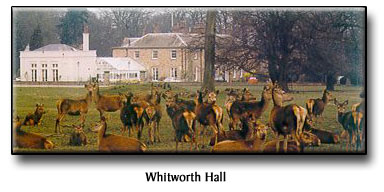 |
||||||||||||
 |
 |
 |
||||||||||
 |
||||||||||||
 |
 |
 |
||||||||||
|
If you consult the standard reference of English surnames (A Dictionary of English Surnames 3rd Edition by P.H.Reaney and R.M.Wilson published by Oxford University Press 1995) the following entry can be found : Whitworth Elyas de Witewurde 1194 (Surrey);
Other reference books relate to the Old English interpretation of the surname as the habitation of a white enclosure. It is likely that this interpretation is the derivation of the Whitworth surname. Those carriers of the Whitworth name today are likely to have adopted it as a result of an ancestor who lived in or owned land in some place called Whitworth. Until the reign of Henry VII Whitworth ancestors would have the surname in the form 'de Whitworth'. My research, which relates to the collection of data from the time of the Norman Conquest, suggest that it is a name held by those who were resident in or owners of the lands in two particular locations in Northern England. The first is that area contained in a valley (Whitworth Vale) to the North of Rochdale in Lancashire, now known as the Township of Whitworth. The second is the small village and parish of Whitworth in County Durham, next to and adjoining the now much larger township of Spennymoor. Records of families who owned and occupied the valley of Whitworth Vale are well documented in the book (Rochdale and the Vale of Whitworth by William Robertson pub George Kelsall 1897). Many other records exist from the time of the Norman Conquest and although the main owners do not represent a continuous ancestral line of one family, almost all who owned the land and lived there adopted the 'de Whitworth' name. Many of the records of Whitworth Vale are linked to those of the closest large town of Rochdale. In Rochdale the name Whitworth would have differentiated between those of the town and those of the Vale and later the township. Even today, the surname Whitworth is more prominent in the township of Whitworth and the town of Rochdale than anywhere else. The chapelry at Whitworth was a part of the parish of Rochdale until the middle of the eighteenth century. The present parish church of Whitworth, was built during the last century and overlooks, from its present high vantage point, the township and valley. The history of the estate and parish of Whitworth in County Durham is shrouded in many mysteries and little is known of its earliest origins. First records of those named 'de Whitworth' exist for that area from as early the thirteenth century but these are few. Some records indicate that families also occupied properties in Woodham, adopting the name 'de Woodham' and sometimes later adopting the name 'de Whitworth'.  The few families that have been traced, who carried the name to places such as Richmond in the North Riding of Yorkshire, appear to have failed to produce future Whitworth family generations. Today a small parish church exists at Whitworth, it was rebuilt in the nineteenth century replacing a succession of early churches, the earliest of which dates back to the twelth century. The Hall and its its impressive surroundings, which did include until recently a vineyard and brewery, this year were being converted into a country leisure centre. The village properties have now almost completely gone, some of the few remaining properties have been absorbed by the much more recently established town of Spennymoor, which owes its existence to the boom in coal mining industry there. If you are today a holder of the surname Whitworth, it is most likely that your family will be able trace its roots back to the township of Whitworth near Rochdale. The migration from that location has seen large numbers of Whitworth families established in the the nearby counties of the North and Midlands of England. Most Whitworth families have immediate origins in England in the counties of Cheshire, Derbyshire, Lancashire, Leicestershire, Lincolnshire, Northamptonshire, Nottinghamshire or Yorkshire. In London since early times there has been an isolated hardcore of families holding the Whitworth name, their relationship to families elswhere has tended to be of high at the higher levels of English society. |
Variations
of the Whitworth name can be many.
A few of those are: Whitworthe Whiteworth Whytworth Whytworthe Witworth Witworthe Whitwoorth Wytworth Whitwort Wyteworth |